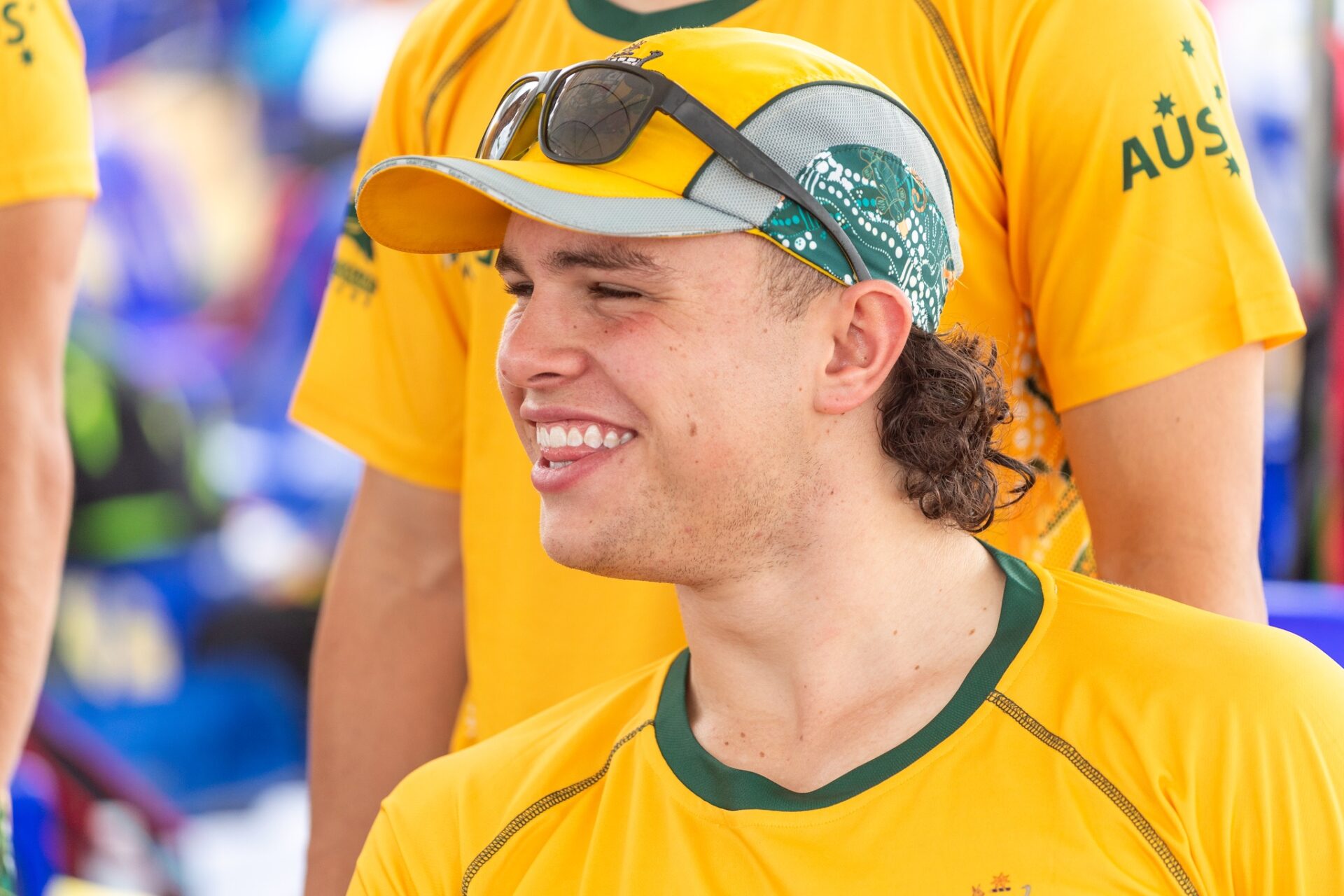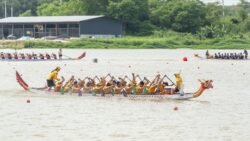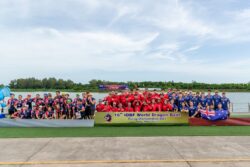
Interview with Ben Weaver | UNE Sports Academy
Meet Ben Weaver, a second-year Bachelor of Agriculture student and resident of Robb College. But Ben isn’t just about textbooks and lectures! He’s also a dedicated dragon boat paddler with a passion for the sport and a drive to succeed.
This interview dives into Ben’s world, exploring his journey as a student-athlete. We’ll learn about:
- His experience paddling for the Sydney Zodiacs and the Australian Under 24’s team.
- The intricacies of dragon boat racing, from teamwork to gruelling competitions.
- How Ben manages to balance demanding training schedules with academic commitments.
- The challenges and triumphs that come with being a student-athlete.
Read on to learn more!
What are you currently studying at UNE and where are you from?
Currently, I am in my second year of a Bachelor of Agriculture, originally from Sydney, I moved to Armidale to study in 2023.
What is your main sport, how long have you been involved, and what initially attracted you to it?
My main sport is Dragon Boat Paddling, which I have been a part of the Sydney Zodiacs since I was about 13. Initially what attracted me was my family history of water sports, from kayaking to Dragon boats, as well as my Aunty being the head coach of my youth club. However, what kept me interested in the sport is the people, the fitness, and the fun.
People may not be that familiar with this sport, can you explain how it works? Can other people take part in a town like Armidale?
Dragon boat paddling is quite an obscure sport, but it’s quite simple. There are 2 boat sizes we race and train in, a small boat which contains 10 paddlers and a big boat which contains 20. As well as this, there are 2 other non-paddlers in the boat, a Sweep on the back of the boat, who controls the direction of the boat and acts as the ‘Captain’ of the boat while on the water. The other is called a Drummer, like a Cox in rowing, their job is to motivate the boat, keep timing on the boat and repeat the calls of the sweep, who will communicate to the paddlers what they need to be doing. The stroke is a forward movement motion, in which all paddlers attempt to maintain perfect timing, following the lead of the Strokes, who are the 2 people in the front seat of a boat whose job it is to create the timing and intensity levels.
Other than training, Dragon Boat regattas are usually held once a month or so, depending on the area. These races take the form of 200m, 500m, 1km and 2 km as standard racing distances, and due to the various distances, stroke form and types varies so no race is ever the same as the next.
There are also various divisions that allow for the different ages to race against each other. The main divisions being Juniors, Under 24’s, Premier and the Senior teams. In these divisions, there are 3 categories of races being opens, women’s and mixed.

Could you describe your typical training routine? What does a typical day or week of training look like for you?
Typically, normal paddlers will train 3 times a week on water as well as their own fitness gym work. For me personally, due to Australian team selection in 2023 and State selection in 2024, I train a bit more than the average paddler.
I am in the gym at least 5 days a week for about 2 hours a day, I have 3 water sessions per week as well as 3 cardio sessions.
On a paddling training day, I will get up around 7am for my morning run, of about 3-5km. Then I rehydrate and get some nutrients into me before heading to classes and sorting out my day. Then around lunch time I’m in the gym for couple hours, getting some rest and recovery before I head to training at 5:30pm until 7pm.
What are some specific skills or techniques you focus on during your training sessions?
The main skills I focus on is maintaining technique, balancing power and speed in my stroke and the mental toughness to keep pushing myself despite how hard the session is.
A usual session varies due to specifically training for the next race, whether it be long distance or short, which means each training can be different from the last. Essentially the skills that all paddlers will focus on during trainings sessions, regardless of upcoming races is keeping timing with the stroke, correcting any technique issues, and increasing fitness levels.
How do you balance your academic responsibilities with your athletic commitments?
The main way I balance academic responsibilities with athletic commitments is by asking for help when I need it and trying to get the most out of each day as possible. I know that most of my days are pretty packed out with sports commitments, so when I’m not training, I’m using every minute I can to get as much done each day. Some days might be busier than others, meaning I won’t get as much done academically however just a bit each day allows me to stay on track.
Do you have any major competitions coming up in 2024?
My next major competition is AusChamps, being held in Perth from April 19-21, in which I will be Captaining the Under 24’s NSW State team. My club will also be participating the in International Club Championship, held in Italy later this year.
What has been your most memorable competition so far, and why?
My most memorable competition was with the Under 24’s Down Under Team, comprised of the 24’s Australian team members when we went to Taiwan last year. This was an International Dragon Boat festival, in which we were invited as the only Australian team to participate and where we earnt ourselves a runner up medal. While the trip was short, the racing was intense and exciting, and the team spent the entire trip laughing and enjoying every moment, which is what paddling is all about.
Can you share a particularly challenging moment you faced during a competition and how you overcame it?
The most gruelling moment during a competition I remember vividly, it was during the Thailand Auroras (The name of the Australian team) campaign for the Under 24’s last year. After a full week of high intensity back to back paddling, we had moved on from 200m and 1km, with about 6 races in each distance. It came to the second 2km race of the day on day 4, in the blistering and muggy Thailand heat, where everyone in the boat was feeling the fatigue. In a mixed 20 boat, our team started the races with flying colours, from the get-go our team started putting in everything they had to give. A normal 2km last about 8 minutes, but this race felt like it went for hours, and by the end of every person in the boat was screaming and yelling, pushing each other to push past our limits. In the last 500m or so, I could feel the fatigue set in and was in pain throughout my whole body, particularly in my Rotator Cuff which I had injured previously. Despite this I knew I couldn’t let anyone in the boat down and kept pushing through the pain, knowing that for 8 months everyone in that boat had given their blood, sweat and tears to each other, and even during the race each one of us gave everything we had to give, which landed us a bronze medal.
How do you prepare yourself mentally and physically before a competition?
In the lead up to a competition, physically I’m getting in as many sessions as possible, whilst mixing this with protective exercises for joints and muscles. During the session, I don’t imagine my myself training, rather like I am racing, so each drill I give 100%.
Before a race, physically I’m warming my full body up with the team, before personally warming up my joints using bands and exercise directed by a physio. However the main component I focus on is my mentally going into a race, which is give everything you have got, and repeating to myself one of my favourite quotes, “fire in the heart, ice in the mind”, which reminds me to not allow adrenaline and passion to overtake me completely and still focus on what I need to do to get the win.
How important is teamwork in your sport? Can you share an example of a time when teamwork played a crucial role in achieving success?
Teamwork is the most essential part of paddling; without it, it wouldn’t work. The team must work together to balance the boat, work together to achieve perfect timing, and put in as much effort as the person sitting next to you. Paddlers must also work with the Sweep, who will be making calls, and the team must work together to follow the calls.
One of my favourite moments in paddling explicitly showed how crucial teamwork was, as during the race the boat timing fell off during a 2km race. The boat began to tip side to side, which can lead to the boat tipping. Despite the stress of capsizing, the team listened to the sweep, who called up to power up, which is an unusual call to make while tipping. Every paddler in the boat powered up, and we were about to regain our timing, recover from the tipping and go on to win the race. Had we not all worked together to get the boat back on track, we would have capsized and been disqualified.

Who are some of your biggest supporters or mentors in your athletic journey, and how have they helped you?
There are 2 main names that come immediately to mind, my Head Club Coach Mary Weaver, and my Auroras Coach Tom Wicks, both of whom taught me so much.
Mary has been a coach since the Sydney Zodiacs was started, back in 2013, when she founded the club. Since 13, she has been my main coach, teaching me everything I know about paddling and constantly developing my skills and encouraging me to take my skills which I had been developing to the next level, to the Australian team. She was my motivation to train, my motivation to win and my greatest paddling mentor, and I am grateful for being able to be coached by one the best youth coaches in Australia, if not the best.
After Mary asked me to trial for the Auroras, I was unsure I had the skill set or fitness levels to participate, so I expressed my interest in the team. Through this, I got on a phone call with Tom Wicks and immediately knew that his passion for the Under 24’s division was unmatched, knowing in that phone call that to be coached by him would be an immense privilege. For 8 months, Tom coached the Auroras, taking us from a group of paddlers and transforming us into a family. He always brought intensity and motivation and taught me how important mental toughness was in paddling, which I was able to translate into all aspects of my life. He was an outstanding mentor, constantly pushing us to our limits, and reaching levels I never thought I could.
How do you handle setbacks or disappointments in your sport, and what strategies do you use to bounce back?
Setbacks and disappointments are inevitable in all sports, whether losing a race or going through an injury. My strategies to bounce back from a disappointment is to acknowledge where I went wrong, know where I can improve and never forget it. Where not forgetting the disappointment may sound counterproductive, however I use the fuel from the disappointment to challenge myself to push even further.
In what ways has participating in this sport influenced your personal development?
This sport changed my life, from a young age I was quite shy, however this sport allows you meet so many good people, it allows you to open up and engage with people from all backgrounds.
It has also has taught me the importance of health and fitness, while being able to balance work and play.
What are your long-term goals as a student-athlete, both in your sport and academically?
My long term goals as a student- athlete is continue to maintain the academic life and the sporting side. I hope to graduate in the next few years, but my main goal is to trail for the Under 24’s Australian team again next year, which I hope to compete in Germany for.
Is there anything else you’d like to share about your experiences as a student-athlete or any advice you would give to aspiring athletes?
While it may be difficult sometimes, and stress and anxiety can put a lot of pressure on you, just remember what you do it for. Do it for your passion in the sport and keeping pushing through each day, each day will get better and better. And enjoy every moment, no matter how big or small.
If you are interested in giving Dragon Boating a try, come along to the Dragon Boating Come & Try event on Sunday, 28th April. Everyone is welcome!


